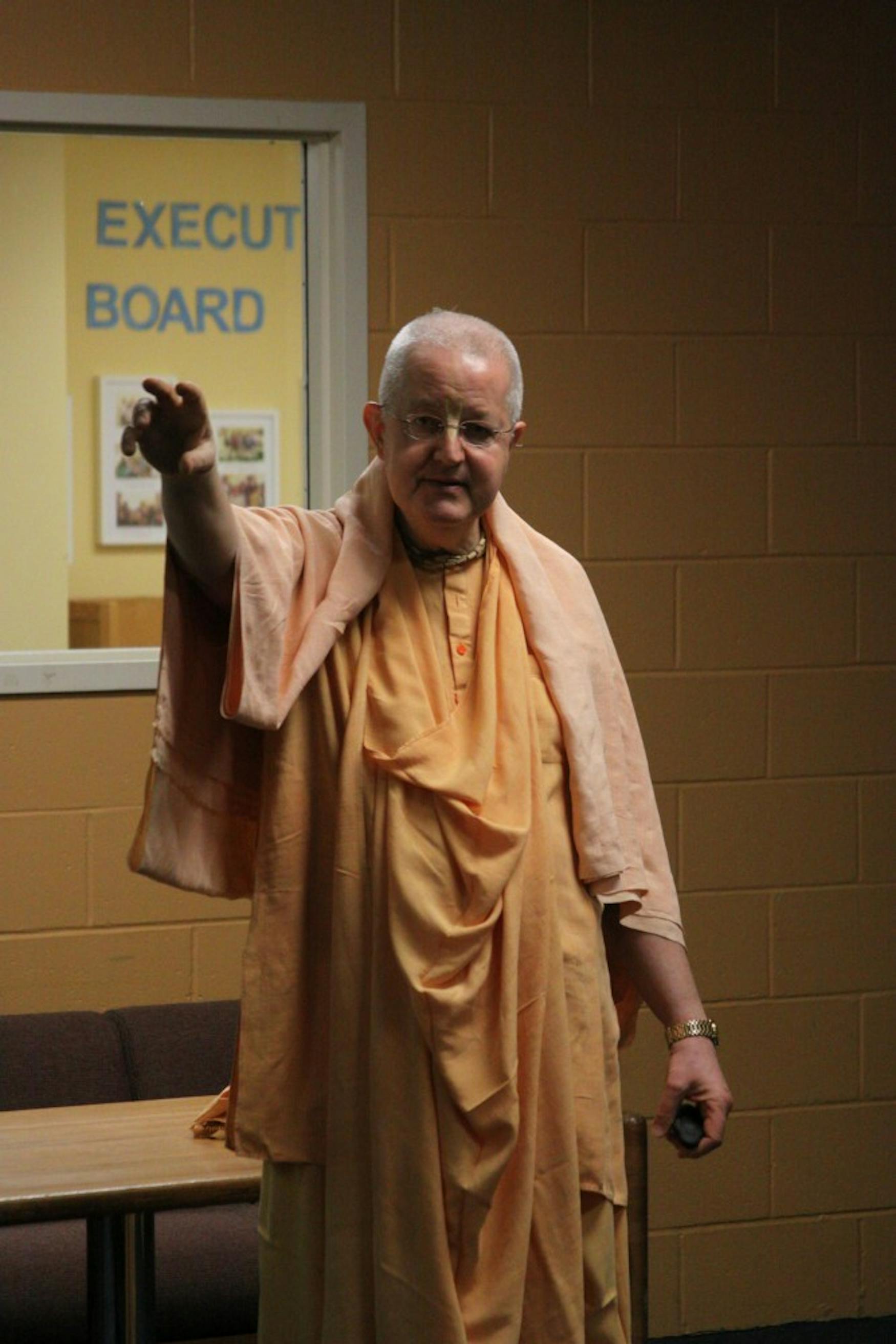Namaskar hosts guru to speak on spirituality
The group continued their effort to raise awareness of Hindu, Sikh and Jain culture on campus during the event.Namaskar, a student group established to educate and promote Hindu, Jain and Sikh culture and spiritual heritage, hosted its first event of the year last Tuesday. Vaishali Gupta, the University’s Hindu chaplain, helped to plan an event to host Romapada Swami, a Hindu guru, on stress control, meditation and spirituality.
“I see the students in their first weeks of college. Any approach to stress management, any type of council, makes sense for college students in general,” said Gupta in an interview with the Justice.
Romapada explained that members of Namaskar enjoy exploring spirituality and spiritual practices and that his program would provide practical resources, such as mediation, to deal with stress management and would help provide the students with ways to enhance their spirituality.
“I hope to add value to the lives of the students,” Romapada said in an interview with the Justice. “Life has its stresses, and student life isn’t free from stresses. I hope to provide methods to face stress with a practical and spiritual approach.”
Romapada spoke of the difference between healthy stress and toxic stress. To deal with worry and future stresses, Romapada used an analogy—imagining worries as rocks.
He said, “Life throws rocks at us. It hurts, but you can’t change or reverse it. We can either pick the rock up and beat ourselves with it, or we can toss it in the air and consider our options. Don’t deny that the rock was thrown but work within your powers to make the situation better,” he said.
Romapada continued to discuss medical research that suggests that meditating and relaxing actually facilitate the natural healing processes of the body.
The event concluded with students chanting a mantra in unison with Romapada while holding Hindu prayer beads in their hands.
Many students said they find that meditation is the answer to stress management. Shruti Vaidyanathan ’16, co-president of Namaskar, said in an interview with the Justice that she grew up in a Hindu family that “was very focused on spirituality.”
She said that took the advice of her grandparents when she was 12 years old to meditate on a daily basis. But once she came to college, she said that she did not keep up with her ritual as much as she had at home. “I distanced myself from my culture and my faith.”
“Recently I’ve come back to it. I attended a Hindu spiritual retreat over the summer for five days. I meditate in the morning and do yoga in the afternoons,” she continued. “I enjoyed this session very much because it not only furthered my spirituality but it also showed me how to apply these techniques practically.”
Niveda Baskaran ’15, who serves on the executive board of Namaskar as co-president along with Vaidnayathan, said in an interview with the Justice that “[p]resentations like these are not only important for the Hindu community here at Brandeis, but are also really good for expanding Namaskar’s membership.”
The group hosts two major events throughout the year, Diwali, the festival of lights in the fall, and Holi in the spring.
This year, Diwali is taking place during Fall Fest on Oct. 24.
Baskaran explained that there would be a puja, or a prayer ritual, followed by a dinner.
She added that it would be possible to make diyas, which are clay lamps, and rangoli, which is a form of artwork, throughout the night.
Last February, the University postponed the opening of a Hindu prayer space until a later, unknown date.
The prayer space was supposed to be housed in the Harlan Chapel; however, some members of Protestant community contested that they would be uncomfortable sharing the space.
In regard to last winter’s controversy, Vaidyanathan commented that “[w]e don’t need a permanent prayer space immediately. But we do need a place to worship. Having a permanent space on a campus so devoted to diversity, unity and social justice will make the community stronger.”
She continued, “We were able to have a civilized discussion last winter [following the controversy] to get awareness out there, but there are still several misconceptions that are held about Hinduism. It hurt at first to discover the ignorance of the general population but like [Dean of Students] Jamele Adams says, ignorance is an opportunity to educate and share peacefully.”
This past Tuesday’s program was designed to include not only Hindu students and members of Namaskar, but also the entire Brandeis community. Namaskar, according to Vaidyanathan and Gupta, hopes to hold more events that will enhance interfaith understanding in the future.




Please note All comments are eligible for publication in The Justice.